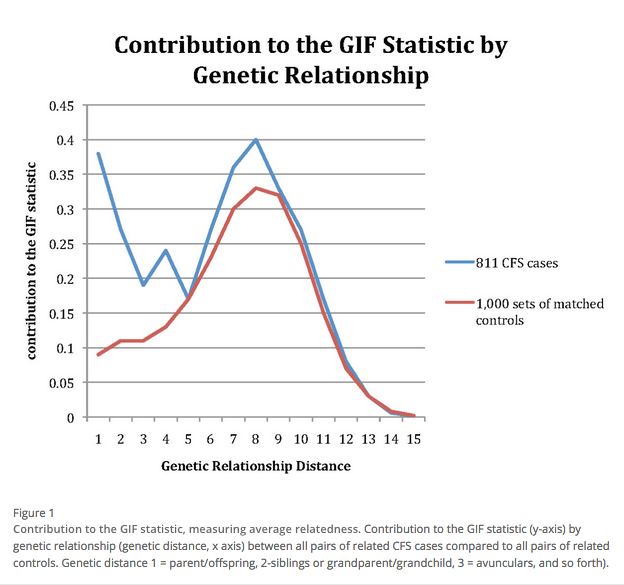Genetics of chronic fatigue syndrome
A 2011 study by F. Albright, K. Light, A. Light, L. Bateman, and L. Cannon-Albright showed evidence of a heritable contribution to CFS. Using the extensive records of the Utah Population Database (UPDB), the study "shows clear evidence of significant excess familial clustering and significantly elevated risks for CFS among first, second, and third degree relatives of CFS cases. The results strongly support a genetic contribution to predisposition to CFS as it is currently defined and diagnosed by clinicians in Utah." Increased outbreak rates in first degree relatives are not automatically assumed to be genetic because the first degree relatives often share the same lifestyle and environment. However, a significantly increased incidence (95% confidence interval) in second and third degree relatives strongly indicated a genetic contribution to CFS, given the much lower likelihood of these relatives sharing common risks and environments.[1]
A 2001 study in the UK showed "there were significantly higher rates of CFS in the relatives of CFS cases compared with the relatives of control subjects."[2] Three twin studies (one in Australia, one in Washington, US, both in 2001, and one in the UK in 2007) showed that the correlations for prolonged and chronic fatigue were significantly higher in monozygotic than dizygotic twins for each definition of chronic fatigue syndrome.[3][4][5]
One study showed that patients with mitochondrial DNA from certain haplogroups correlated with variations in gastrointestinal, neurological, and inflammatory symptoms.[6]
Notable Studies[edit | edit source]
- 2016, Genome-wide association analysis identifies genetic variations in subjects with myalgic encephalomyelitis/chronic fatigue syndrome (FULL TEXT)
Abstract - "Myalgic encephalomyelitis, also known as chronic fatigue syndrome or ME/CFS, is a multifactorial and debilitating disease that has an impact on over 4 million people in the United States alone. The pathogenesis of ME/CFS remains largely unknown; however, a genetic predisposition has been suggested. In the present study, we used a DNA single-nucleotide polymorphism (SNP) chip representing over 906,600 known SNPs to analyze DNA from ME/CFS subjects and healthy controls. To the best of our knowledge, this study represents the most comprehensive genome-wide association study (GWAS) of an ME/CFS cohort conducted to date. Here 442 SNPs were identified as candidates for association with ME/CFS (adjusted P-value<0.05). Whereas the majority of these SNPs are represented in non-coding regions of the genome, 12 SNPs were identified in the coding region of their respective gene. Among these, two candidate SNPs resulted in missense substitutions, one in a pattern recognition receptor and the other in an uncharacterized coiled-coil domain-containing protein. We also identified five SNPs that cluster in the non-coding regions of T-cell receptor loci. Further examination of these polymorphisms may help identify contributing factors to the pathophysiology of ME/CFS, as well as categorize potential targets for medical intervention strategies.[7]
- 2016, Mitochondrial DNA variants correlate with symptoms in myalgic encephalomyelitis/chronic fatigue syndrome (Maureen Hanson, January 20). See also Mitochondrial DNA and ME/CFS - A Guide to the Hanson Lab's 2016 JTM Publication.
- 2001, A twin study of chronic fatigue
"Abstract - OBJECTIVE: The etiology of chronic fatigue syndrome is unknown, but genetic influences may be important in its expression. Our objective was to assess the role of genetic and environmental factors in unexplained chronic fatigue. METHODS: A classic twin study was conducted using 146 female-female twin pairs, of whom at least one member reported > or =6 months of fatigue. After completing questionnaires on symptoms, zygosity, physical health, and a psychiatric interview, twins were classified using three increasingly stringent definitions: 1) chronic fatigue for > or =6 months, 2) chronic fatigue not explained by exclusionary medical conditions, and 3) idiopathic chronic fatigue not explained by medical or psychiatric exclusionary criteria of the chronic fatigue syndrome case definition. Concordance rates in monozygotic and dizygotic twins were calculated for each fatigue definition along with estimates of the relative magnitude of genetic and environmental influences on chronic fatigue. RESULTS: The concordance rate was higher in monozygotic than dizygotic twins for each definition of chronic fatigue. For idiopathic chronic fatigue, the concordance rates were 55% in monozygotic and 19% in dizygotic twins (p =.042). The estimated heritability in liability was 19% (95% confidence interval = 0-56) for chronic fatigue > or =6 months, 30% (95% confidence interval = 0-81) for chronic fatigue not explained by medical conditions, and 51% (95% confidence interval = 7-96) for idiopathic chronic fatigue. CONCLUSIONS: These results provide evidence supporting the familial aggregation of fatigue and suggest that genes may play a role in the etiology of chronic fatigue syndrome.[3]
Media Coverage[edit | edit source]
- 2016, Genome-wide associations
- 2016, New study found SNPs for some symptoms (CFS Remission, January 23)
See also[edit | edit source]
References[edit | edit source]
- ↑ Albright, Frederick; Light, Kathleen; Light, Alan; Bateman, Lucinda; Cannon-Albright, Lisa A (2011), "Evidence for a heritable predisposition to Chronic Fatigue Syndrome", BMC Neurology, 11 (62), doi:10.1186/1471-2377-11-62
- ↑ Walsh, CM; Zainal, NZ; Middleton, SJ; Paykel, ES (2001), "A family history study of chronic fatigue syndrome", Psychiatric Genetics, 11 (3): 123-8, doi:10.1097/00041444-200109000-00003, PMID 11702053
- ↑ 3.0 3.1 Buchwald, D.; Herrell, R.; Ashton, S.; Belcourt, M.; Schmaling, K.; Sullivan, P.; Neale, M.; Goldberg, J. (2001), "A twin study of chronic fatigue.", Psychosomatic Medicine, 63 (6): 936-943, PMID 11719632
- ↑ Hickie, IB; Bansal, AS; Kirk, KM; Lloyd, AR; Martin, NG (2001), "A twin study of the etiology of prolonged fatigue and immune activation", Twin Research, 4 (2): 94-102, doi:10.1375/1369052012209
- ↑ Schur, Ellen; Afari, Niloofar; Goldberg, Jack; Buchwald, Dedra; Sullivan, Patrick F. (2007), "Twin analyses of fatigue", Twin Research and Human Genetics, 10 (5): 729-733, doi:10.1375/twin.10.5.729
- ↑ Reference needed
- ↑ Schlauch, Karen A.; Khaiboullina, Svetlana F.; De Meirleir, Kenny L.; Rawat, Shanti; Petereit, J; Rizvanov, Albert A; Blatt, Nataliya; Mijatovic, Tatjana; Kulick, D; Palotás, András; Lombardi, Vincent C. (2016), "Genome-wide association analysis identifies genetic variations in subjects with myalgic encephalomyelitis/chronic fatigue syndrome", Translational Psychiatry, 6 (2): e730, doi:10.1038/tp.2015.208


